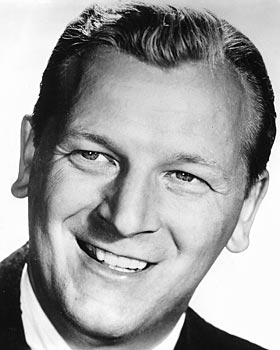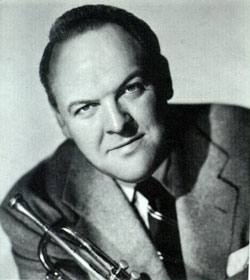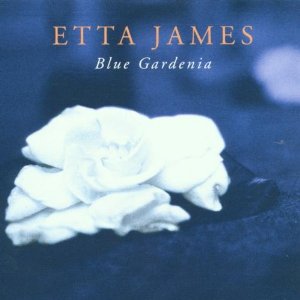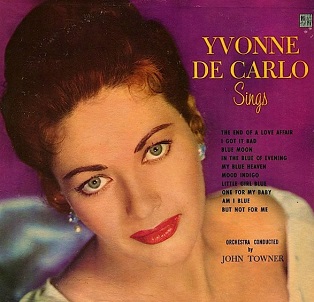
Leslie Thompson Baxter was an American musician, composer and conductor. After working as an arranger and composer for swing bands, he developed his own style of easy listening music, known as exotica and scored over 250 radio, television and motion pictures numbers.
Martin Denny was an American pianist, composer, and arranger. Known as the "father of exotica," he was a multi-instrumentalist and could play a number of percussion instruments. In a long career that saw him performing up to 3 weeks prior to his death, he toured the world popularizing his brand of lounge music which included exotic percussion, imaginative rearrangements of popular songs, and original songs that celebrated Tiki culture.

Edward William May Jr. was an American composer, arranger and trumpeter. He composed film and television music for The Green Hornet (1966), The Mod Squad (1968), Batman, and Naked City (1960). He collaborated on films such as Pennies from Heaven (1981), and orchestrated Cocoon, and Cocoon: The Return, among others.
The Blue Hawaiians are a Los Angeles band that combines elements of surf music, exotica and lounge. They formed in 1994 to play at the opening of their friend Michelle's Hollywood club, The Lava Lounge. They soon gained recognition with the help of the connection of one of their earliest fans, Quentin Tarantino, and appearances on the soundtrack of the television series Friends and the 1996 film Sex. The group have since released several albums which have generally fared well with critics. The band also composed and recorded music for the cartoon series SpongeBob SquarePants, and their song "A Cheat" was featured in an advertisement for Guess Jeans.

Ella Swings Brightly with Nelson is a 1962 studio album by the American jazz singer Ella Fitzgerald, accompanied by an orchestra arranged by Nelson Riddle.

Songs for Young Lovers is the seventh studio album by Frank Sinatra and his first on Capitol Records. It was issued as an 8-song, 10" album and as a 45rpm EP set, but it was the first Sinatra "album" not to have a 78rpm multi-disc-album release. In 2002, it was one of 50 recordings chosen that year by the Library of Congress to be added to the National Recording Registry.

Swing Easy! is the eighth studio album by Frank Sinatra. It was released in 1954 as a 10" album and consisted of only eight songs, as each side of the record only allowed approximately fourteen minutes of music.

No One Cares is the seventeenth studio album by Frank Sinatra, released on July 20, 1959. It is generally considered a sequel to Sinatra's 1957 album Where Are You?, and shares a similar sad and lonesome, gloomy theme and concept as In the Wee Small Hours and Only the Lonely.

The Complete Ella Fitzgerald Song Books were a series of eight studio albums released in irregular intervals between 1956 and 1964, recorded by the American jazz singer Ella Fitzgerald, supported by a variety of orchestras, big bands, and small jazz combos.

The Complete Capitol Singles Collection is a compact disc box set by the American singer Frank Sinatra, released on Capitol Records in 1996. The four-disc set contains all 45 singles released by Sinatra during his tenure at the label between 1953 and 1961. Of those, 25 made the Top 40 on the Billboard singles chart. It does not include releases specifically for jukeboxes or for extended play singles, with one exception. The original tapes were digitally remastered by Bob Norberg.

"Sweet Leilani" is a song featured in the 1937 film, Waikiki Wedding. It won the Academy Award for Best Original Song, and Bing Crosby's record became one of the biggest hits of 1937.
"Don't Get Around Much Anymore" is a jazz standard written by composer Duke Ellington. The song was originally entitled "Never No Lament" and was first recorded by Duke Ellington and his orchestra on May 4, 1940. "Don't Get Around Much Anymore" quickly became a hit after Bob Russell wrote its lyrics in 1942.

Polynesian Fantasy is an album by The Out-Islanders released in 1961. The Out Islanders was a one-time combination of many of music industry's leading side men brought together by Billy May, who arranged and conducted the album, and Charlie Barnet, who played saxophone on the album.

Blue Gardenia is the twenty-fifth studio album by Etta James, released through the record label Private Music. It was produced by John Snyder, who had worked with James on five of her previous studio albums. Blue Gardenia contains thirteen jazz standards from the 1930s, 1940s and 1950s. All of the standards were arranged by pianist Cedar Walton, with the exception of "Love Letters", which was arranged by Josh Sklair. Between November 2000 and February 2001, Snyder and Walton assembled musicians to record tracks while James was recovering from a flu; her vocals were added following her recovery. In addition to Walton, artists appearing on the album included Red Holloway on tenor saxophone and Dorothy Hawkins, James' mother, who provided vocals on the title track. Hawkins died in May 2002, less than a year after the album's release.

Sinatra: Best of the Best is a 2011 double compilation album by American singer Frank Sinatra.

Dream with Me is an album by the American singer Tommy Sands. It was arranged by Nelson Riddle and released in 1960.

Love Is a Game of Poker is the fourteenth studio album by American composer and arranger Nelson Riddle, released in 1962.

Route 66 Theme and Other Great TV Themes is the thirteenth studio album by American composer and arranger Nelson Riddle, named for Riddle's theme music from the television series "Route 66". The album was nominated at the 5th Annual Grammy Awards for the Grammy Award for Best Instrumental Theme and the Grammy Award for Best Instrumental Arrangement.

Yvonne De Carlo Sings is a studio album by Canadian-American actress and singer Yvonne De Carlo, released in 1957 by the Remington subsidiary label Masterseal Records. It features an orchestra conducted by film composer John Williams, who was credited as John Towner.
The Tikiyaki Orchestra is a seven piece modern exotica band that combines the sounds of traditional exotica with the Music Of Hawaii, surf music, crime jazz, lounge music and space age pop to create a soundtrack for the Tiki sub-culture.
















